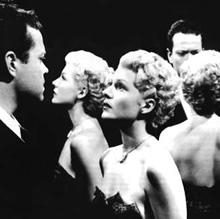How to Disappear Completely, Vol. 1 - The Lady from Shanghai
 For a filmmaker whose best work was already considered behind him, The Lady from Shanghai proves how harshly Welles was treated by the studio system, and how critics fell in line to magnify all the minor flaws in his subsequent work. A radical film by today's standards for its underlying political meaning, The Lady from Shanghai stands out; it's not often that one finds such a subtle intrigue in the characters and their political leanings - whether it's in the cannibalistic pathology of the leisure class, the brutal pragmatism of the working class hero, or the vindicated criminality that permeates the story and implicates everyone involved.
For a filmmaker whose best work was already considered behind him, The Lady from Shanghai proves how harshly Welles was treated by the studio system, and how critics fell in line to magnify all the minor flaws in his subsequent work. A radical film by today's standards for its underlying political meaning, The Lady from Shanghai stands out; it's not often that one finds such a subtle intrigue in the characters and their political leanings - whether it's in the cannibalistic pathology of the leisure class, the brutal pragmatism of the working class hero, or the vindicated criminality that permeates the story and implicates everyone involved.Artistically speaking, it's been fascinating to find that when Welles directed himself he couldn't help but be a fading tyrant, or have access, even as a servant, to power, and the ways in which Welles used the camera to illustrate power relations, servility and authority. Whether behind the camera or in front of it, he chose to show the impotence of wealth as part of a trajectory of power and justice, like making Macbeth an axiomatic principle and a theory of filmmaking. The curse of reckless ambition applies to Welles' career itself, but in film he treats it less as an act of aggressive commission (even Citizen Kane doesn't seem as permanently manic as say Gordon Gecko) and more as an illness that creeps over its passive victim, a disposition likely influenced by his interest in European proto-existentialism and continental philosophy.
The problem of agency in these films is part of their sophistication, and The Lady from Shanghai is hardly an exception. Agency, secrecy and manipulation dictate the action, and Welles never flinches from combining the visual aspects to exacerbate the narrative chaos, choosing dizzying shots and disorienting angles to contort and distort appearance and perception, a visual relativism of sorts. Perhaps what's most interesting in terms of agency is an overall lack of culpability. Welles treats his characters as pawns in a confidence game, one disappearance holding the key to several fortunes and Welles knows that there can be no winners.
The span between Black Irish Mike O'Hara's casual understanding of this central gambit and his employer's professional mendacity gapes wide to swallow the streetsmart O'Hara whole. In a world of no innocents, Welles uses San Francisco in much the same way Polanski used L.A. almost thirty years later in Chinatown. What O'Hara counts as his advantage is the tricky matter of disappearing, something he has done repeatedly without attachments, out of his willingness to walk away from material comforts that he feels entrap their owners, the very things for which, in his mind, the leisure class barters away its freedom. Welles endows his characters with Hitchcockian prescience, balancing instinctual traits with cunning and subtlety.
Like many of Welles' films, the proximity to power corrupts and Schlesinger, Jr.'s aphorism regarding power rings true: in these retellings of Macbeth and Lear, great men are denuded by their ambition and negligence. How to disappear completely, for Welles, means a willingness to forego any permanency, to betray those commonsensical values about stability and comfort. However, he doesn't trumpet the individual as an entity unto himself, completely unencumbered; rather, The Lady from Shanghai maintains its intellectual and emotional complexity until its final moments, sublimating individual motivations and explicating the meanings of sacrifice, tragedy and absurdity, leaving all that is solid to melt into air.

1 Comments:
I agree with everything you said and still don't like this film very much – my least favorite of Welles' films. My own take is closest to David Thomson's in "Rosebud."
I really do wish Chimes At Midnight would get a DVD release. The VHS copy I checked out of my college library (last checked out by yours truly in 1994!) is literally crumbling.
Post a Comment
<< Home